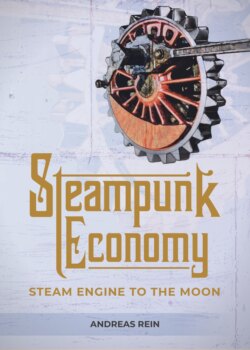Читать книгу Steampunk Economy - Andreas Rein - Страница 10
На сайте Литреса книга снята с продажи.
ОглавлениеPART 1.
THE WORLD WE LIVE IN
„The world has just changed so radically, and we're all running to catch up.“
DR. ALAN GRANT
The world we live in is an increasingly networked world. Information is available at all times because the medium in which information is disseminated is spreading unchecked and in many areas uncontrolled. The unbridled availability of information - and I'm not talking about knowledge, that requires intelligence - is the result of the exponential spread of information media, that is, the technology that makes information available. Anything can reach virtually any place on earth in real time and can be reproduced as often as desired, provided no artificial restrictions on access are imposed. If not all information is to be available, a great effort is made to keep it away from certain groups, networks, countries. As freely as information can spread - regardless of its truthfulness - it is relentlessly censored, as in China, not made available at all, as in North Korea, or distorted and skewed for disinformation purposes, as in our hemisphere. With information available worldwide, practically all product catalogues are available globally - just not in North Korea. From now on, every trader is in international competition and customers are no longer at the mercy of local offers. Information, knowledge and education are virtual goods that are distributed at the speed of light and whose local offerings can be compared with national and international offers.
Our educational institutions are increasingly using the media to make their content accessible to learners. However, it is often overlooked that not only the technology has to be digitally ready, but also the learning content. And this means the actual content, i.e. the topic to be taught, as well as the associated didactics. The content must be contemporary, the delivery format must be appropriate for acceptance and the technology must be functional. Only all three factors together make modern ways of learning and education possible. Otherwise, what happens is that we spread outdated knowledge and teach people methods which are not adapted to the new, fast world.
At the same time, the pressure on educators increases because seemingly more and more is expected of them. The delivery method of teaching is changing - hopefully - and with it the demands on teachers. But is it not a core task of teachers to propagate lifelong learning and to enable learners to do so? As a teacher, must I not first and foremost be able to develop and learn? It is not the content that changes. I don't believe that fundamentally new subject matter is being added in mathematics, physics, biology or politics. It's the form that has to adapt. Prefabricated templates have a shorter half-life. And suddenly, performance in a digital delivery form is comparable, content is almost transparent and teaching quality can be assessed. Why are some teachers not interested in this? Perhaps because it exposes their own inability to develop further.
Trying to grasp a new world with outdated methods overwhelms the possibilities of the methods. The perfidious thing about it is: Up to now, the methods have been correct and have served us well. They have been tested for their correctness again and again over decades and we have rarely had any real reason to doubt. Moreover, in some cases there was simply no alternative. But suddenly we have to realise that our recipes for success from yesterday no longer work today. Obviously, the environment is changing in such a way that standard methods are simply no longer effective. The results are no longer a good basis for decisionmaking and the considerations increasingly contain blind spots. It is not enough to train a little here and learn a little there - we need a different attitude and must establish different methods with it.
Some attempts to face the new realities seem almost tragic from the outside, when a completely unsuitable means is supposed to bring an unattainable goal closer. They are reminiscent of the attempt to reach the moon with a steam engine. But only Doc Brown can build a freezer with a steam engine. We must either change our goals and expectations or rethink the concept of the steam engine. Both are difficult. But only one will succeed in the long run. I can decide whether to cut the world as I know it or to take the risk of breaking new ground and accepting uncertainty.
This book is about that dissent.
